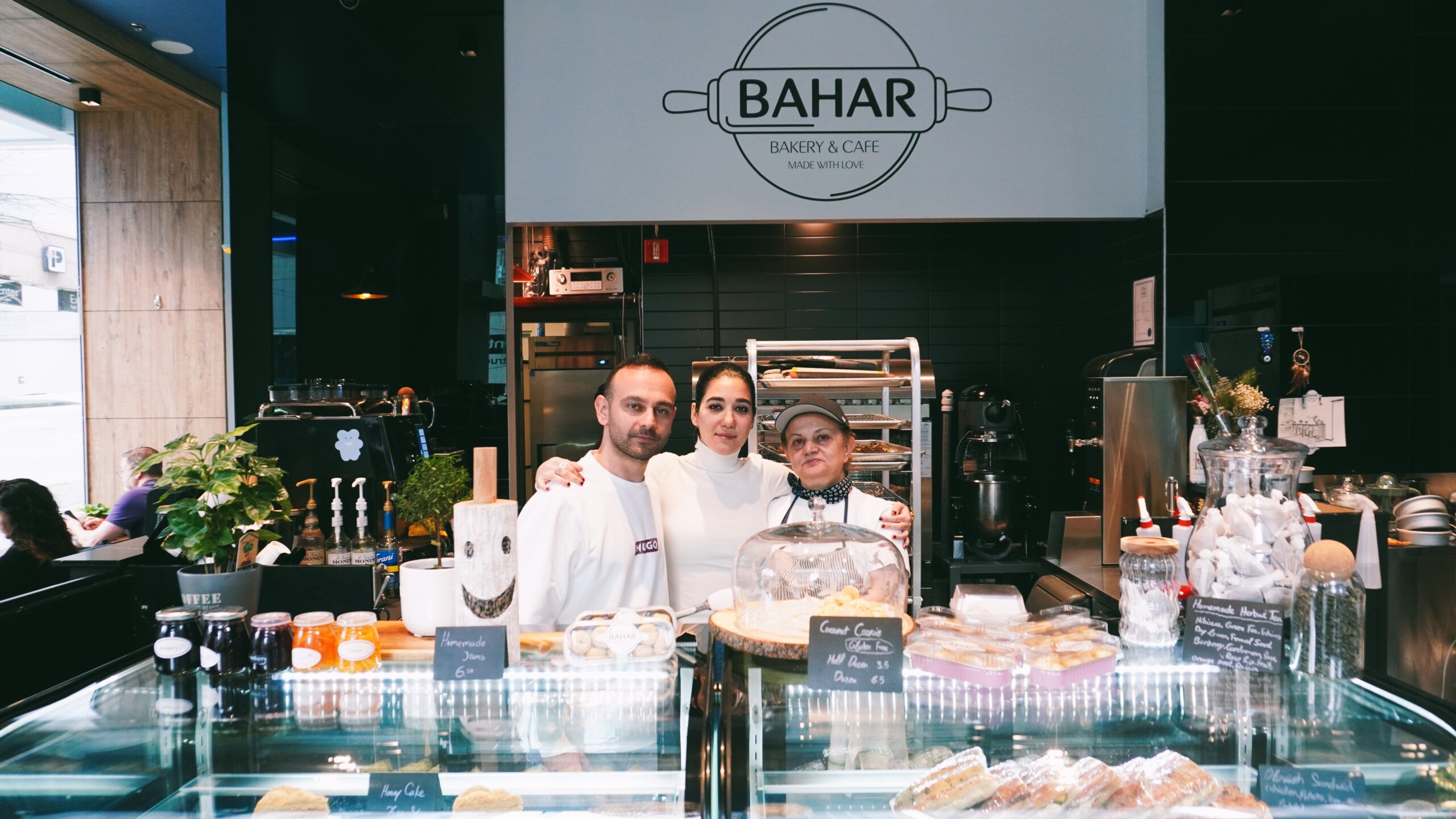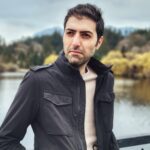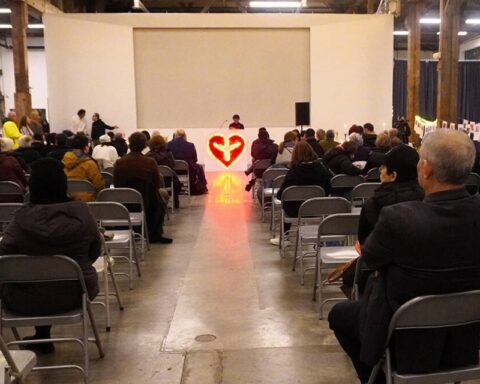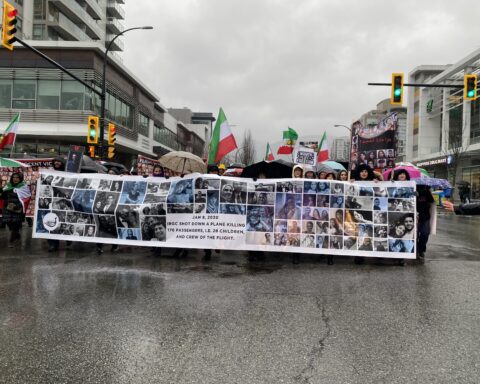We sat behind the counter at Bahar Bakery & Café, with a view of the sidewalk at the corner of Robson and Seymour Streets in Vancouver, discussing our decision to immigrate. Suddenly, he smiled, waved his hand, and a man walking past reciprocated with a smile.
“He is Darya Toghian’s brother, another passenger of the PS752 flight, and we met when I decided to establish the café; he helped me,” says Ali Karami Moghadam, Bahareh Karami Moghadam’s brother.
Bahareh, 33, and Darya, 22, were both permanent residents in Canada, but they didn’t get to return home. Time stopped for them and the 174 other passengers on Jan. 8, 2020. They lost their lives when Flight PS752 was shot down over Iran by two missiles fired by Iran’s Islamic Revolutionary Guard Corps.
In memory of Bahareh, Karami Moghadam and his mother, Beheshteh Rezapour, opened the café last August. “I decided to follow one of my sister’s dreams. She always dreamed about opening a bakery for my mother in Canada,” he said.
Karami Moghadam and his mother started planning for the café two years ago. “It’s impossible to not think about the tragedy, but at least you can do something to think less and keep yourself alive,” he said.
The café serves coffee and tea along with handmade jams, house-made cakes, pastries and Bahareh’s favourite treat, baklava; Rezapour prepares the baklava her daughter loved.
Another mother who lost her 30-year-old daughter, Negar Borghei , and son-in-law, Alvand Sadeghi, 29, on the flight, also works at the cafe. Sadeghi’s sister, Sahand, and her five-year-old daughter Sophie were also returning to Canada on that flight.
Four years ago: A nightmare in the sky
“We had just taken my sister to the airport, and we stayed with her for an hour,” Karami Moghadam said.
On their way back home, Bahareh’s mother was scrolling through her timeline on X (the social media platform formerly known as Twitter) and as Karami Moghadam says: “She began reading loudly the headline, Ukrainian plane crashes with 180 on board in the capital of Iran.”
Karami Moghadam pulled over the car to call the airport and they confirmed the news. While he and his family were uncertain about the possibility of survivors on the plane, they began driving back to the airport.
At first, the state radio reported the crash was caused by mechanical issues.
“I was just screaming and driving and when we arrived at the airport, everything seemed prepared,” Karami Moghadam said. “A woman introduced herself as a therapist to my mother and gave her a calming pill. I wondered how it is possible to find therapists now? I thought everything had been arranged, how could this happen?”
The authorities cleaned up the crash site and bulldozed the area just hours after the plane crashed. Eight hours after the tragedy, some evidence was published on Twitter (which, like other platforms such as Facebook, Instagram, and YouTube, is banned by the Islamic regime), revealing that the flight had been shot down by missiles.
Prime Minister Justin Trudeau, and the former U.S. president, Donald Trump held press conferences, addressing the public and discussing the suspicion. Three days after the crash, the United Kingdom, Australia, the Netherlands, Ukraine, Canada and the U.S. all confirmed that the plane was hit by two missiles. Still, the Islamic Republic continued to deny any involvement. On the fourth day, the regime admitted that Flight PS752 was shot down by two missiles fired by the IRGC.
“At 4 a.m my mother and I were in my sister’s bedroom when unexpectedly I saw a piece of news that had just come out,” Karami Moghadam said. “The IRGC shot down the flight. I didn’t know what to do at that time.
“My mother was lying just beside me. What should I tell her? I said, ‘Mom, let’s have breakfast. After breakfast, my uncle suddenly entered the kitchen and said the Islamic Republic confessed they shot down the plane with two missiles. My father just passed out right after hearing that. It was like another missile striking our home again.”
When asked to share a memory of his sister, tears fill Karami Moghadam’s eyes. “The last moment we hugged each other, we said goodbyes. We hugged again, left and turned back once more. The cycle repeated three times. My mother the day after, said to me, ‘How did you know your sister would leave us?’”
A colleague who came to work with a smile
Bahareh’s mother was born in a family of bakers who used to own a bakery in Iran. Her daughter always wanted to open a bakery for her mother, and now her dream has come true.
“She was the one who always tried to bring smiles to people,” Karami Moghadam said. “I remember that just a couple of days after the tragedy, Minister François-Philippe Champagne had a speech. He started with a sentence in memory of a colleague who came to work with a smile every Monday morning. The colleague was my sister.”
Bahareh was born in 1986 in Iran and had a master’s degree in environmental engineering. In 2009, she traveled to the U.S. to study at North Carolina University.
Bahareh started working at the global engineering firm, Black & Veatch, in the U.S. After five years, she decided to move to Toronto to work in the company’s Canadian office. “She said, ‘I love Canada; I’m going to stay here,’” Karami Moghadam said. “She played the violin, danced, helped people and enjoyed her short but beautiful life.”
Still seeking justice four years later
“For me justice means bringing back my sister,” Karami Moghadam said. “How is that possible? If you’re responsible for the investigation, how can you clean up the crash site immediately after the tragedy?
“It raises questions, suggesting that they might be trying to hide something. They shot down the plane intentionally and used the 176 passengers as human shields.”
In July 2023, the Flight PS752 case was referred to the International Court of Justice. “It’s a long process, but we need to take the Islamic Republic to the international court,” Karami Moghadam said. “Also, some families of the victims have filed claims against the Islamic Republic, the IRGC and the authorities responsible in the tragedy in the Supreme Court of Ontario.”
Among the 176 people who lost their lives, 55 were Canadian citizens, and 30 were permanent residents.
A Vancouver B.C based journalist who writes about the Iranian community in Canada, art, culture and social media trends.




